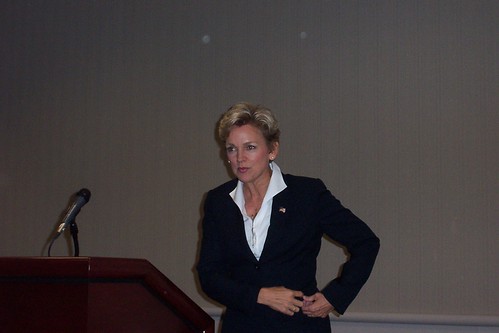
(Wendypants/Flickr)
In the United States, softball interviews with politicians are all too common. There are too many handlers and too many media outlets vying to get the “EXCLUSIVE.” One thing that struck me while studying in Britain during Tony Blair’s premiership was how often Blair would subject himself to drilling from reporters on the unpopular Iraq war. By contrast, George W. Bush took a decidedly Bartleby approach to the press.
The British prime minister faces aggressive questioning from MPs each week during
Question Time and has his responses mocked accordingly. American voters don’t enjoy similar treats. Sure, we celebrate our freedom from the monarchy with massive consumption of grilled meat and beer on Fourth of July, but the president is treated more like the queen and less like the prime minister.
Christopher Hitchens wrote a fantastic
Vanity Fair article back in 2006 about the late Italian journalist Oriana Fallaci and the demise of the art of the interview. The part that stayed with me was the beginning:
Here is an excerpt from an interview with what our media culture calls a "world leader":
Dan Rather: Mr. President, I hope you will take this question in the spirit in which it's asked. First of all, I regret that I do not speak Arabic. Do you speak any … any English at all?
Saddam Hussein (through translator): Have some coffee.
Rather: I have coffee.
Hussein (through translator): Americans like coffee.
Rather: That's true. And this American likes coffee.
And here is another interview with another "world leader":
Oriana Fallaci: When I try to talk about you, here in Tehran, people lock themselves in a fearful silence. They don't even dare pronounce your name, Majesty. Why is that?
The Shah: Out of an excess of respect, I suppose.
Fallaci: I'd like to ask you: if I were an Iranian instead of an Italian, and lived here and thought as I do and wrote as I do, I mean if I were to criticize you, would you throw me in jail?
The Shah: Probably.
The difference here is not just in the quality of the answers given by the two homicidal dictators. It is in the quality of the questions.
Charlie Gibson is no Oriana Fallaci and Sarah Palin is no Shah. I had very low expectations of the hyped up
interview and, as a result, was not disappointed. Palin was clearly not answering some of Gibson’s questions and he was right to push her on some of them. He did not push all the way, but at least he did it. The question about her being able to handle her large family and the vice presidency was inappropriate. Interestingly, though, when he asked her if she thought it was a sexist question, she ran away from the word as if it were a contagious disease.
The Bush doctrine part of the interview has turned into an embarrassment for both sides. In the previous post, Barbara argues that Palin was right to ask Gibson for a clarification on which aspect of the Bush doctrine he meant.
U.S. News and World Report Report’s
Robert Schlesinger points out that Gibson should have used “preventive war” instead of “pre-emptive war.” My main beef with Gibson is that he used language that was unfamiliar to many people watching the program. Still, Palin is not just one of the viewers, and it was pretty clear to me that she did not have the foggiest idea about what he was talking about:
GIBSON: Do you agree with the Bush doctrine?
PALIN: In what respect, Charlie?
GIBSON: The Bush—well, what do you—what do you interpret it to be?
PALIN: His world view.
GIBSON: No, the Bush doctrine, enunciated September 2002, before the Iraq war.
PALIN: I believe that what President Bush has attempted to do is rid this world of Islamic extremism, terrorists who are hell bent on destroying our nation. There have been blunders along the way, though. There have been mistakes made. And with new leadership, and that's the beauty of American elections, of course, and democracy, is with new leadership comes opportunity to do things better.
GIBSON: The Bush doctrine, as I understand it, is that we have the right of anticipatory self-defense, that we have the right to a preemptive strike against any other country that we think is going to attack us. Do you agree with that?
PALIN: I agree that a president's job, when they swear in their oath to uphold our Constitution, their top priority is to defend the United States of America.
I know that John McCain will do that and I, as his vice president, families we are blessed with that vote of the American people and are elected to serve and are sworn in on January 20, that will be our top priority is to defend the American people.
GIBSON: Do we have a right to anticipatory self-defense? Do we have a right to make a preemptive strike again another country if we feel that country might strike us?
PALIN: Charlie, if there is legitimate and enough intelligence that tells us that a strike is imminent against American people, we have every right to defend our country. In fact, the president has the obligation, the duty to defend.
Asking
tough, well-researched questions is one of the most important tasks that a reporter has. Honest answers to those tough questions set great politicians apart from mediocre ones.





